
Types of Light Switch Covers and Outlet Covers
Need help choosing a wall plate?
When choosing light switch covers or outlet covers, consider the size dimensions of the electrical box and the light switch or outlet's shape and size.
Assess wall plate material options, such as plastic, metal, or wood, weighing factors like durability and maintenance. Ensure the wall plate
configuration matches the wiring devices you're installing. Check for dimmer compatibility if you plan to use dimmer switches. Factor in any
special features, such as screwless wall plate designs or additional functionalities, while also staying within your budget for a well-rounded decision.
Size Dimensions of Light Switch Covers and Outlet Covers
Single Gang Wall Plate Sizes (1 Gang)
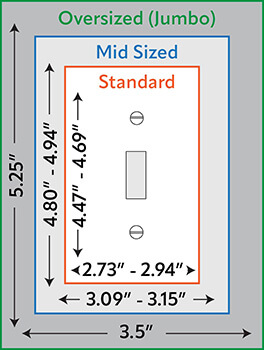
Double Gang Wall Plate Sizes (2 Gang)
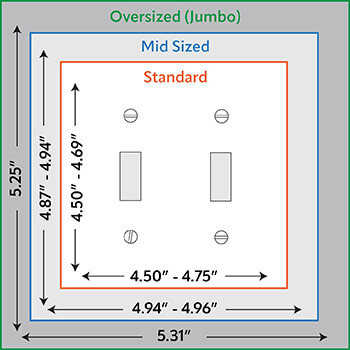
3 Gang Wall Plate Sizes
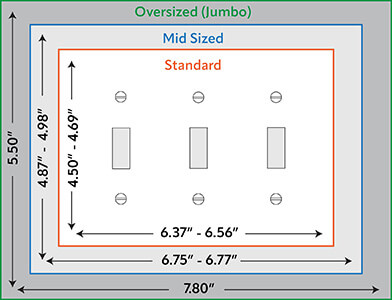
4 Gang Wall Plate Sizes
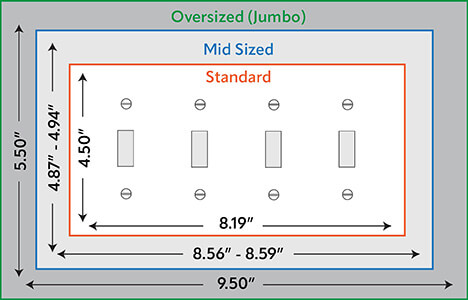
Materials for Light Switch Covers & Outlet Covers
Thermoplastic Light Switch Covers
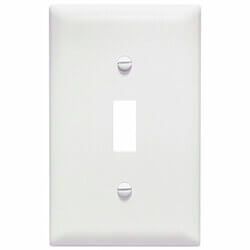
Thermoplastic switch plates provide a lightweight, cost-effective option with good impact resistance and are preferred for hospital, industrial, and other high-abuse applications.
Shop Thermoplastic Wall Plate
Stainless Steel Light Switch Plate
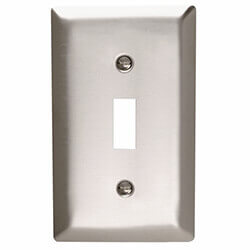
A stainless steel switch plate offers durability, corrosion resistance, and a modern appearance, making it a long-lasting and visually appealing
choice for electrical switches and outlets.
Shop Stainless Steel Wall Plate
Aluminum Light Switch Covers
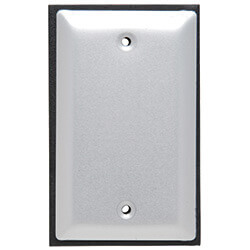
Brushed aluminum wall plates can be weather-resistant with weatherproof design features such as protective gaskets or seals intended for indoor and outdoor
locations.
Shop Aluminum Wall Plates
Nylon Light Switch Covers
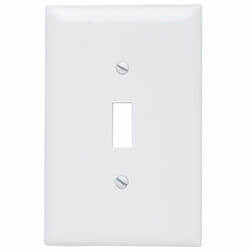
Many nylon switch plates are designed to be self-extinguishing, meaning they have fire-resistant properties and can resist combustion without an
external ignition source.
Shop Nylon Wall Plate
Styles for Light Switch Covers & Outlet Covers
Toggle Light Switch Covers

Toggle light switch covers have a small, center rectangular cutout to fit a toggle light switch. Toggle light switch
covers have historically been the most common light switch cover style.
Shop Light Switch Covers
Decorator Wall Plate
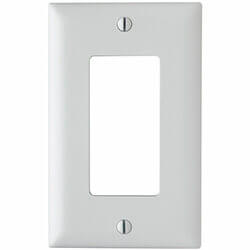
A decorator wall plate or rocker wall plate is for large rectangular-shaped devices such as rocker light switches, dimmers, GFCI outlets,
and motion sensor lighting.
Shop Decorator Wall Plate
Combination Wall Plates
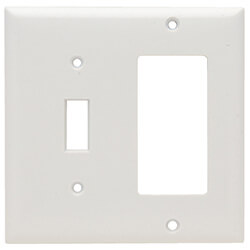
Combination wall plates are a single cover that accommodates various electrical components, such as light switches, GFCI outlets, phone jacks, USB charge ports,
dimmer switches, and data ethernet jacks. Combination wall plates are space-saving.
Shop Combination Wall Plates
Coax Wall Plates
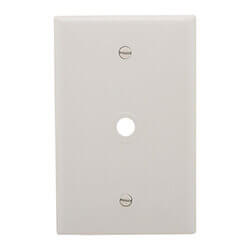
Coax wall plates are designed for coaxial cables that connect cable TV and internet. Coax wall plates can also be used as rotary dimmer
switch plates. Coax jacks may be in combination wall plates with additional Ethernet or telephone ports.
Shop Coax Wall Plates
Blank Wall Plate
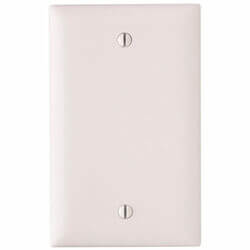
A blank wall plate is a cover without any openings. The purpose of a blank wall plate is to conceal and protect unused electrical boxes or mounting
locations in a building's walls.
Shop Blank Wall Plate
Phone or Ethernet Wall Plate
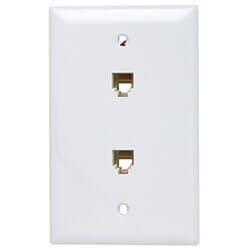
An Ethernet wall plate or a telephone wall plate has a built-in connector for networking cables or telephone cables that connect equipment to the
building's phone, data, or internet.
Shop Data Comm Wall Plate
Outlet Covers
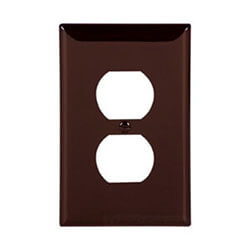
Outlet covers, also called receptacle covers, are designed to cover wiring for outlet wiring devices to prevent accidental contact with live
wires and protect the wiring. Some outlet covers feature weatherproof covers.
Shop Outlet Covers
Screwless Wall Plates
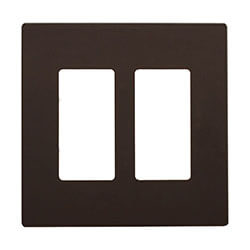
Screwless wall plates are a two-layer wall plate cover. To install screwless wall plates, first screw the inner mounting plate
into the wiring device, then snap the top outer layer onto the inner mounting plate so that no screws are visible.
Shop Screwless Wall Plates
Shop Related Products
Warning: When using this information to perform electrical work, call a licensed electrician or consult the NEC® for safety.
All licensed electricians have passed examinations covering the National Electric Code®, know state and local building codes, and may
carry insurance to cover damages.